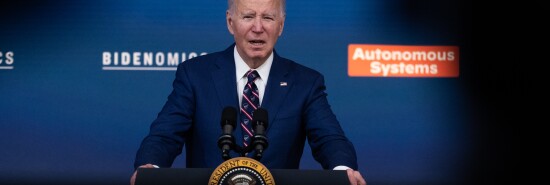
Average people are ticked off that ‘Bidenomics’ made them poorer
Tiana Lowe Doescher
Video Embed
As a branding exercise, “Bidenomics” has proven a total bust. House Democrats have abandoned the moniker as they begin to campaign for the 2024 election, and Treasury Secretary Janet Yellen, with the academic chops to know much better, has resorted to blaming the pandemic for the message’s failure to resonate with the public. Across academia, elite economists such as Claudia Sahm and Paul Krugman are baffled at why exactly the unwashed masses cannot understand that the economy is good, actually.
The reason is that, in the ways that matter, the economy is not good for the average person.
INFLATION SLOWS TO 0.9% IN NOVEMBER IN PRODUCER PRICE INDEX
The White House will first point to the unemployment rate, which has persisted at or around half-century lows despite the Federal Reserve raising interest rates at breakneck speed. For the economic bubble still living in the collective delusion of the post-2008, zero-interest-rate-policy mindset, this low unemployment is good. For anyone who has gone to a McDonald’s or tried to hire child care, we understand that as boomers age into retirement, the labor shortage isn’t just a problem. It’s one that accelerates the bankruptcy of Social Security and our welfare state while further fueling inflation.
Biden’s backers will then point to the inflation rate, which has fallen precipitously from last year’s near double-digit peak. This ignores three crucial factors. First and most obviously, inflation remains about twice as high as the Fed’s maximum target of 2%. Second, the entire disinflationary crusade has been fought solely by the Fed and against the White House, which has repeatedly pursued inflationary fiscal policy with the occasional assistance from rebel Republicans. Third and most importantly, inflation is cumulative, and cumulatively, it has made the average worker much, much poorer in real terms.
Prices are up more than 17% since Biden took office, according to the consumer price index. Essential goods, which comprise a greater share of budgets for working- and middle-class folks than the wealthy, have gotten even more expensive, with food prices up 20% and energy prices up 32%.
Most people haven’t received 17% or 20% or 32% raises in that time. In fact, average real wages are 3% lower than their peak in April 2020 and 2% lower than the pre-pandemic trend. Furthermore, the regulatory costs of Bidenomics have amounted to $10,000 annually per average household, per University of Chicago professor Casey Mulligan.
All of this ignores the policy failures that have manifested themselves as economic woes. While the Fed’s rate hikes have jacked up mortgages back to their historical average, the real culprit of housing affordability (or, rather, the stunning lack thereof) is a decade of zoning law that allowed homeowners to stop renters from building new supply in order to preserve their own property values artificially. That’s one arena where Biden is not responsible. Yet, based on the deluge of development in Trump-supporting states and counties and failure to build in Biden-supporting jurisdictions, local Democrats are to blame.
CLICK HERE TO READ MORE FROM THE WASHINGTON EXAMINER
The common man is not necessarily good at prescribing solutions to economic problems. A CBS News poll found that whereas 60% of people oppose raising interest rates to control inflation, perhaps the single greatest factor influencing the slowdown of inflation since its peak last summer, two-thirds support the idiocy of price controls, which not only defy theoretical economic consensus but also historical precedent, considering President Richard Nixon’s cataclysmic experiment that resulted in the stagflation of the 1970s.
But the plebeians are perhaps more in touch with economic realities than the patricians trying to explain away their disgust with the state of the economy. While the academic class may care more about the 5% annualized economic growth rate, the ordinary folks are wondering why that growth hasn’t trickled down to their own lived experiences.
